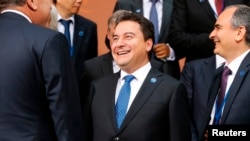Finance ministers and central bankers from the world's 20 leading economies are gathering to discuss coordinating action to spur global economic
growth.
The G-20 ministers concerns about major economies running at different speeds and monetary policies diverging will top the agenda at talks Monday and Tuesday in Istanbul.
Influencing the ministers' plans are the Greek government's demands to restructure its debt, cheap oil influencing inflation and growth forecasts, and a strengthening dollar threatening emerging economies.
Turkish Deputy Prime Minister Ali Babacan said Sunday tackling sluggish growth and giving low income nations more voice are among the priorities for Turkey's G20 presidency.
Babacan said pushing G20 members to meet previous reform commitments would be key.
Fulfilling pledges made at November's G20 summit in Brisbane could add more than $2 trillion to the global economy and create millions of new jobs over the next four years, IMF chief Christine Lagarde said in a blog post Friday.
'Not sustainable'
Another top G20 concern is whether the United States alone can sustain the global economy as most of the world slows.
Last week, Canadian Finance Minister Joe Oliver cited the stalled eurozone, slowdowns in China and India, and geopolitical crises in Ukraine, Iraq and Syria as key risks.
"Though America is carrying the world economy at the moment, that is simply not sustainable," he added.
U.S. Treasury Secretary Jack Lew also said the United States could not be "the sole engine of growth" and a senior U.S. official told reporters Washington's message at the meeting would again be that Europe is not doing enough.
Also on the agenda will be a request by France to discuss the fight against terrorist financing, an important topic for Turkey as fighting with Islamic State militants continues just over its southern borders in Syria and Iraq.





